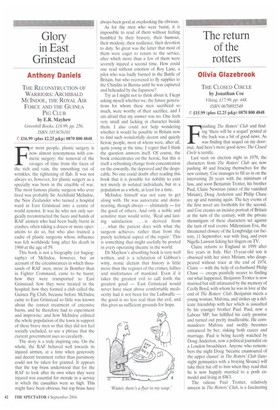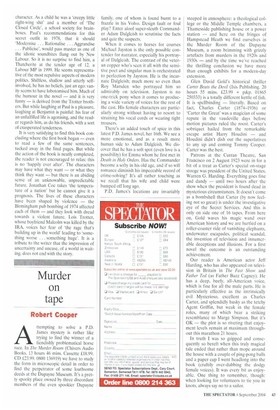The return of the rotters
Olivia Glazebrook
THE CLOSED CIRCLE by Jonathan Coe Viking, £17.99, pp. 448, ISBN 0670892548 r, £15.99 (plus £2.25 p&p) 0870 800 4848 Finishing The Rouen' Club and finding 'there will be a sequel' posted at the back was a bit of good news. As was finding that sequel on my doormat. And here's more good news: The Closed Circle is terrific.
Last seen on election night in 1979, the characters from The Ratters' Club are now pushing 40 and bracing themselves for the new century. Coe manages to fill us in on the intervening 20 years with the minimum of fuss, and soon Benjamin Trotter, his brother Paul, Claire Newman (sister of the vanished Miriam), Doug Anderton and Philip Chase are up and running again. The key events of the first novel are footholds for the second, and Coe creates an incisive portrait of Britain at the turn of the century, with the private shenanigans of these characters set against the turn of real events: Millennium Eve, the threatened closure of the Longbridge car factory, 11 September, war with Iraq, and even Nigella Lawson licking her fingers on TV.
Claire returns to England in 1999 after five years in Italy. Her 15-year-old son is obsessed with her sister Miriam, who disappeared without trace at the end of 1974. Claire — with the help of ex-husband Philip Chase — creeps painfully nearer to finding out what happened. Benjamin Trotter is now married but still infatuated by the memory of Cecily Boyd, with whom he was in love at the end of The Rotters' Club. Benjamin meets a young woman, Malvina, and strikes up a delicate friendship with her which is assaulted by his younger brother Paul. Paul, now a Labour MP, has fulfilled his early promise and turned out pretty insufferable. He commandeers Malvina and swiftly becomes entranced by her, risking both career and marriage. Paul is being keenly watched by Doug Anderton, now a political journalist on a London broadsheet. Anyone who remembers the night Doug 'became enamoured of the upper classes' in The Rotters' Club (latenight gymnastics with a braying Sloane) will take their hat off to him when they read that he is now happily married to a posh exmodel and living in SW3.
The odious Paul Trotter, relatively unseen in The Ratters' Club, is a fascinating
character. As a child he was a 'creepy little right-wing shit' and a member of 'The Closed Circle', a school society for brainboxes. Paul's recommendations for this secret outfit in 1978, that it should 'Modernise . Rationalise ... Aggrandise ... Publicise', would pass muster as one of the idiotic soundbites flung out by New Labour. So it is no surprise to find him, a Thatcherite at the tender age of 12, a Labour MP in 1999. He seems representative of the most repulsive aspects of modern politics. Shiftless, shallow and utterly selfinvolved, he has no beliefs, just an ego: vanity seems to have lobotomised him. Much of the humour in the novel — and it is very funny — is derived from the Trotter brothers. But while laughing at Paul is a pleasure, laughing at Benjamin is painful: his fear of an unfulfilled life is agonising, and the reader regards him, as do his friends, with a sort of exasperated tenderness.
It is very satisfying to find this book concluding where the first book began — even to read a few of the same sentences, tucked away in the final pages. But while the action of the book is neatly completed, the reader is not encouraged to relax: this is no 'happily ever after'. The characters may have what they want — or what they think they want — but there is an abiding sense of an unknowable, unpredictable future. Jonathan Coe takes 'the temperature of a nation' but he cannot give it a prognosis. The lives of these characters have been shaped by violence — the Birmingham pub bombing of 1974 affected each of them — and they look with dread towards a violent future. Lois Trotter, whose boyfriend Malcolm was killed by the IRA, voices her fear of 'the rage that's building up in the world' leading to 'something worse . . something huge'. It is a tribute to the writer that the impression of uncertainty and unease, of a world in waiting, does not end with the story.



































































 Previous page
Previous page